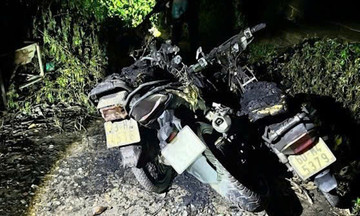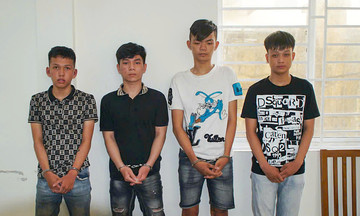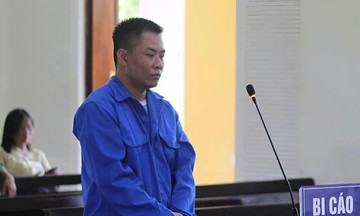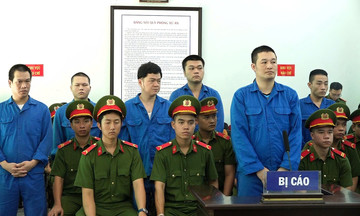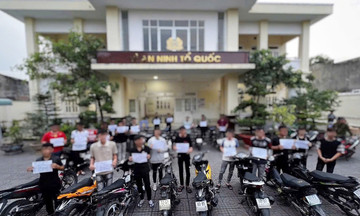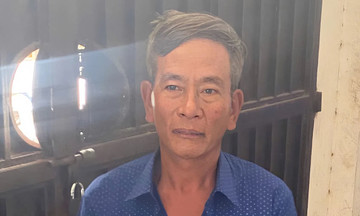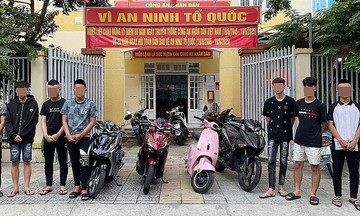On the afternoon of 13/8, 45-year-old Thanh returned to his home in Thinh Tam village, Do Luong commune, after 4.5 months of detention in Thai Binh on charges of violating regulations on the protection of endangered, precious, and rare animals.
The defendant said he was passionate about raising chickens, birds, and ornamental plants. In 2022, he found white pheasants beautiful and bought some to raise and breed. After more than two years, his initial three birds had produced 10 offspring. He was the first person in his village to raise this species.
 |
Defendant Thai Khac Thanh upon returning home to Do Luong commune on the afternoon of 13/8. Photo: Duc Hung |
Defendant Thai Khac Thanh upon returning home to Do Luong commune on the afternoon of 13/8. Photo: Duc Hung
The 45-year-old man explained his simple thinking was "beautiful chickens are fun to raise," and if he could sell them, he would earn extra money. He claimed he didn't know they were endangered and listed in the Red Book (Vietnam's list of endangered species).
"When I was arrested, I was shocked. I didn't think raising a few chickens was such a serious matter. I only understood when the officers explained it to me," Thanh told VnExpress.
At the first-instance trial on 8/8, the defendant also stated he "initially didn't know that raising white pheasants was a violation." Thanh explained his family's difficult circumstances, with an elderly mother, wife, and three young children, and being the primary breadwinner. He requested the lightest possible sentence.
Upon receiving a 6-year sentence, Thanh said he didn't expect to be released on bail, nor did he anticipate the authorities would review the case.
The defendant said he would continue to plead for leniency at the upcoming appellate trial, hoping to reunite with his family soon.
Thanh said he learned a lesson from this incident: to thoroughly research the origins of any animal he intends to raise. If not, it's best not to raise them to avoid trouble. "I hope anyone who has intentions like mine will raise safe species," Thanh said.
Audio recording of defendant Thai Khac Thanh discussing the raising of white pheasants and his hopes for the appeal. Audio: Duc Hung
Case files show that in 2022, Thanh knew white pheasants were endangered, precious, rare, and valuable but forbidden to raise or trade. This led him to breed them. In 2024, he bought a male white pheasant in Can Tho for 4.5 million VND and traded a scarlet minivet for two female white pheasants in Dien Chau.
The hens laid 13 eggs, 10 of which hatched. On 26/3, Thanh agreed to sell the chicks for 500,000 VND each, plus an additional one million VND for raising them. He hired someone to transport the birds from Nghe An to Thai Binh for over 5 million VND.
On the morning of 2/4, when the vehicle carrying the pheasants reached DH07 road, Vu Thu district, police inspected and seized 10 birds in a cardboard box. A search of his home in Thinh Son commune revealed three more white pheasants.
On 8/8, the Regional Court 5 sentenced Thanh to 6 years in prison.
On 13/8, the Hung Yen People's Procuracy appealed the entire verdict, requesting its annulment for reinvestigation. On the same day, the defendant's preventative measure was changed from detention to house arrest.
The Procuracy argued that the first-instance court failed to apply Circular 27/2025 of the Ministry of Agriculture and Rural Development on the management of endangered, precious, and rare species; raising common wild animals; and the CITES Convention, effective from 1/7. According to the circular's appendix, the white pheasant had been reclassified from Group IB (prohibited from commercial exploitation and use) to Group IIB (allowed for commercial breeding under regulations).
 |
Thai Khac Thanh next to the cage holding the white pheasants at the time of his arrest. Photo: C.An |
Thai Khac Thanh next to the cage holding the white pheasants at the time of his arrest. Photo: C.An
The appeal stated the first-instance court's classification of Thanh's 13 pheasants as Group IB and the subsequent sentencing under Clause 2, Article 244 was "inconsistent with the change in legal policy." Therefore, a reinvestigation of the value of the birds is necessary to resolve the case.
Lawyer Duong Le Uoc An (Dai An Phat Law Firm, Hanoi Bar Association) believes the policy change will benefit the defendant. He argues that while Thanh's actions before 1/7 warranted prosecution at that time, the court should have applied Article 29 of the Penal Code during the 8/8 trial. This article allows for exemption from criminal liability when "a change in legal policy renders the act no longer dangerous to society."
The white pheasant (Lophura nycthemera) is a large bird of the pheasant family, inhabiting the mountainous forests of Southeast Asia and China, with 15 subspecies. Adult males (after about two years) have white plumage, a black crest, and a bluish-black or white belly; females have brown-olive plumage throughout their lives. Size: males are 80-127 cm long, females 56-71 cm, weighing 1-2 kg. Breeding season is from February to June, with 4-10 eggs per clutch.
According to the investigation records, the Vietnam Museum of Nature, Vietnam Academy of Science and Technology, concluded on 2/4 that Thai Khac Thanh's 13 birds were white pheasants, scientific name Lophura nycthemera, belonging to the class Aves, order Galliformes, family Phasianidae. White pheasants are listed in Appendix I, Group IB.
Circular 27/2025 of the Ministry of Agriculture and Rural Development, effective from 1/7, classifies the white pheasant as a Group II endangered, precious, and rare species. The circular requires in-situ or ex-situ conservation, breeding for conservation, research, and ecotourism at licensed facilities. All exploitation, breeding, and trading activities must have a legal origin and not harm wild populations. Commercial breeding is only permitted for F2 individuals certified by CITES Vietnam.
Duc Hung




